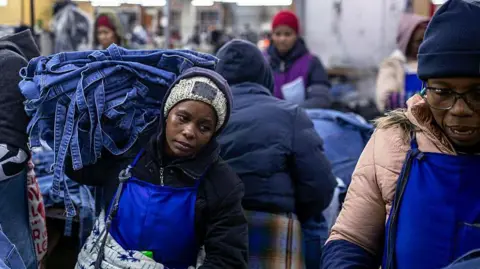Lesotho declares state of disaster amid US tariff uncertainty
 Getty Images
Getty ImagesLesotho has declared a national state of disaster over the country's "high rates of youth unemployment and job losses" as uncertainty over US tariffs hits the landlocked nation.
Lesotho was hit by higher tariffs than any other country - 50% - when they were announced by President Donald Trump in April, although they have since been paused.
Deputy Prime Minister Nthomeng Majara said the state of disaster would be in force until 30 June 2027.
Unemployment in Lesotho stands at 30% but for young people the rate is almost 50%, according to official figures.
The declaration, in line with the country's Disaster Management Act, allows the state to "take all necessary measures to... minimise the effects of disasters" among others.
Officials in Lesotho – a country of just over two million people - say the move will allow the government to quickly divert funds to programmes aimed at getting young people into work and helping the economy to recover.
Several departments have already announced initial steps, including scrapping business registration fees for small and medium-sized start-ups.
The textile-dependent economy was already grappling with sky-high unemployment, especially among young people, before Trump slashed aid and raised trade barriers, according to an AFP report.
- Trump's tariffs could be death knell for US-Africa trade pact
- How jeans and diamonds pushed Lesotho to the top of Trump's tariffs list
- US cuts visa validity for most Nigerian applicants
- Ramaphosa opposes Trump's 30% tariff on South Africa
Lesotho was one of the biggest beneficiaries of the US's African Growth and Opportunity Act (Agoa), which gives favourable trade access to some countries to promote their economic growth.
According to the US government, the two countries traded goods worth $240m (£187m) in 2024, mostly exports from Lesotho to the US, in particular textiles and clothing.
Although the 50% tariffs were paused, Lesotho's exports to the US still face a tax of 10%, like other countries.
One of Trump's aims with his tariff policy is to reduce his country's trade deficit with the rest of the world.
The government has warned it could lose up to 40,000 jobs if Agoa is not renewed at the end of September, according to AFP.
Lesotho's Trade Minister Mokhethi Shelile told South African business news site Moneyweb last month that US buyers were "not placing orders because they don't understand what is going to happen".
The country was also hard-hit by the termination of the US Agency for International Development's (USAID) programmes around the world.
Lesotho is among those countries that benefited from the US President's Emergency Plan for Aids Relief (Pepfar), which was launched in 2003.
Critics say this crisis has been looming for well over a year.
Until March, Lesotho was under an eight-month state of disaster due to severe food insecurity.
At the time, Prime Minister Sam Matekane said around 700,000 Basotho were facing extreme hunger, worsened by prolonged drought.
Political analyst Dr Tlohang Letsie told the BBC that the declaration of a state of disaster was a "positive step" in tackling "worsening youth unemployment".
"Youth groups have been advocating for this for a number of years [and] in recent years there's been an increase in the number of young people roaming the streets without formal employment after leaving tertiary," he said.
The academic denied the US tariffs had any bearing on the government's decision, saying that this move was a "long time coming" and was driven "mainly by years of high youth unemployment".
"However the tariffs, if imposed, could make matters even worse by adding to jobs losses and the loss of opportunities," he said.
Economic analyst Thabo Qesi echoed this viewpoint, saying the tariffs "added to existing challenges in the country" which "which heavily affect the economy and life here".
These included the mass retrenchments of mineworkers in Lesotho, the lingering effects of Covid-19 and climate change-induced draught, Mr Qesi said.
"The high unemployment has led to an increase in crimes such as housebreaking and robberies - these are some of the daily challenges people now face," he told the BBC.
More about Lesotho from the BBC:
 Getty Images/BBC
Getty Images/BBCGo to BBCAfrica.com for more news from the African continent.
Follow us on Twitter @BBCAfrica, on Facebook at BBC Africa or on Instagram at bbcafrica
